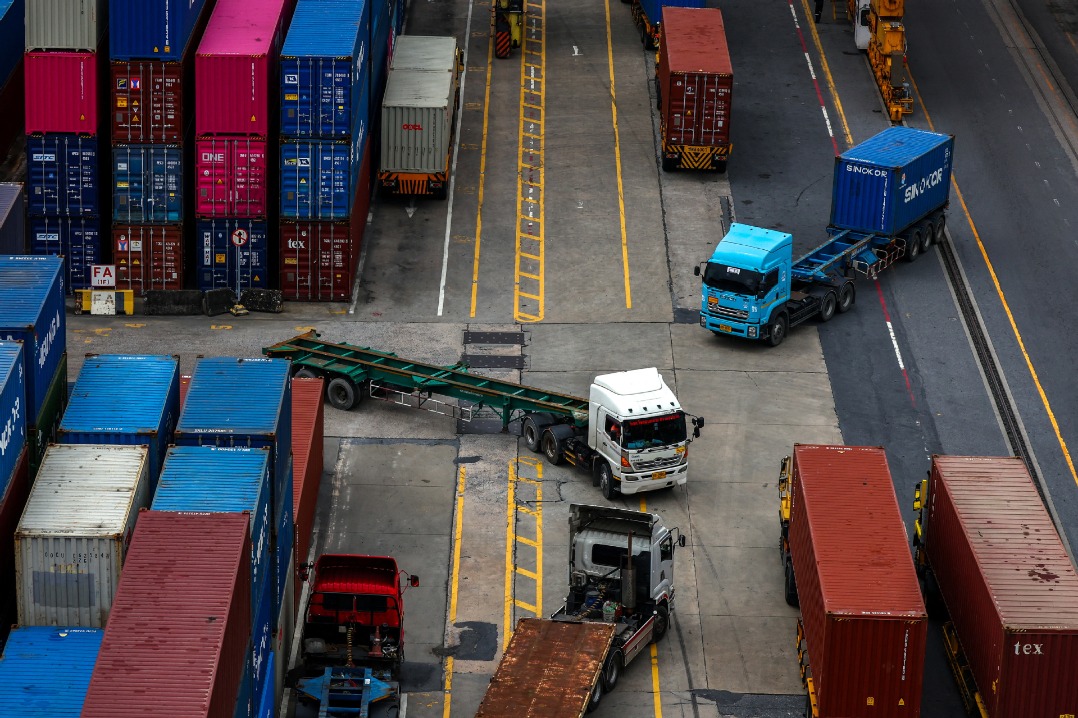China and Europe can be partners in mutual success

Two major developments in European diplomacy have emerged over the past week.
One is that the president of the European Council and the president of the European Commission visited China together, where they joined Chinese leaders in reviewing the fruitful cooperation achieved over the 50 years since diplomatic ties were established, and in opening up a new and even more remarkable chapter for China-Europe relations.
The other is that the US and the EU reached a new trade agreement under which the United States will impose a 15 percent tariff on European Union exports to the US, while the EU will invest an additional $600 billion in the United States and purchase $750 billion worth of US energy. One side emphasizes mutual respect and open cooperation, the other pursues trade bullying and maximum pressure. The stark contrast between these two approaches reflects deeper historical forces at play.
For decades, the foundation of US policy toward Europe has always been "America First", with Washington alternating between exploitation and support based on its own needs.
First, take the field of European integration. Over the past decade, two opposing forces — "solidarity and unity" versus "national interests first" — have increasingly torn at the fabric of the EU, and the US has frequently added fuel to the fire.
During the Trump 1.0 era, his chief strategist Steve Bannon personally visited multiple European countries to rally right-wing forces and interfere in elections. In the Trump 2.0 era, US Vice-President J.D. Vance sharply criticized the EU at the Munich Security Conference, further chilling relations. Trump staunchly supported Brexit and shared mutual admiration with then-British prime minister Boris Johnson, even dangling the prospect of a UK-US free trade agreement — an agreement Britain has yet to taste. After suffering the consequences of Brexit, the UK came to realize that the so-called "special relationship" with the US was far from sweet. The newly elected Labour government is now trying to mend ties with the EU, but a shattered mirror is hard to piece back together.
Then there's the economic domain. The 2008 US subprime mortgage crisis triggered a global financial tsunami and set off the European sovereign debt crisis. International capital fled to the US, and Europe has since struggled with weak growth and mounting debt — deep-seated structural challenges.
During Trump's previous term, he accused Europe of "taking advantage of" the US and wielded the tariff stick. After a round of intimidation, Europe had no choice but to compromise, once again allowing the US to fleece some gains.
Finally, on security. When the Ukraine crisis erupted in 2022, Europe and the Biden administration raised the banner of anti-Russia and pro-Ukraine solidarity. In the ensuing conflict, Europe's post-Cold War security architecture collapsed. The Nord Stream 2 pipeline was mysteriously blown up — a truth perhaps too complex for a simple explanation. Now back in power, Trump has reversed course on Russia policy, calling US aid to Ukraine a waste of resources. Even as he recently softened his stance to allow aid to resume, he still insisted, the EU will "pay us 100 percent" of the cost. In the end, so-called alliance morality boils down to serving US business interests.
Europe has been advocating for strategic autonomy for years, yet its habitual dependence on the US remains deeply entrenched. Recently, former French prime minister Dominique de Villepin urged, "Europe must be true to itself."
In contrast, China has consistently approached Europe with sincerity, upholding mutual respect, seeking common ground while reserving differences, and advocating for open cooperation and win-win outcomes.
China has always supported European integration and views Europe as a partner with whom it can achieve mutual success.
Situated on opposite ends of the Eurasian continent, China and Europe have no geopolitical conflicts or fundamental clashes of interest. China sees Europe as a key pillar in a multipolar world, supports European integration and the EU's strategic autonomy, and remains confident in the EU's development. For Europe, this is an invaluable source of strategic backing. When the UK left the EU, China called for a smooth transition in relations and made it clear: the UK has left the EU, but it has not left Europe. This was not only a rational assessment but also a vital show of support for Europe during difficult times.
China has always supported Europe's prosperity and development. Over the past 50 years of diplomatic ties, cooperation has been the defining feature of China-Europe relations, and exchanges have consistently delivered mutual benefit. Chinese investments in European ports and railways have helped revitalize real economies. COSCO Shipping's acquisition of the near-bankrupt Piraeus Port in Greece has transformed it into the fourth-largest port in Europe. China and Europe are each other's second-largest trading partners. Their complementary strengths and healthy competition are beneficial to both sides. Chinese electric vehicles and photovoltaic products contribute to Europe's Green New Deal goals while also helping reduce costs for European consumers.
China does not deliberately seek a trade surplus, and the EU should show restraint in using restrictive economic and trade tools.
China has always supported long-term peace and stability in Europe and has consistently shown understanding and consideration for European security concerns. When Europe feared the outbreak of nuclear war, China was the first to declare that nuclear weapons must not be used and nuclear war must not be fought. When Europe worried about spillover effects from the Ukraine crisis, China stressed that the battlefield must not expand beyond its current scope. When Europe was concerned about being left out of peace talks, China supported the EU's participation as a stakeholder in resolving the crisis. China calls for resolving disputes through political means and supports building a balanced, effective and sustainable European security architecture — a vision that is in Europe's long-term interest.
Europe's challenges do not come from China, but its opportunities for development cannot do without China. If Europe is determined to pursue strategic autonomy, then it should walk that path with resolve. And on this path, China will always be a partner it can walk alongside.
In a world rife with turmoil, we need more stability and certainty. As two major forces on the global stage, China and Europe should support each other — and together bring greater benefit to the world.
The author is a commentator on international affairs.

































